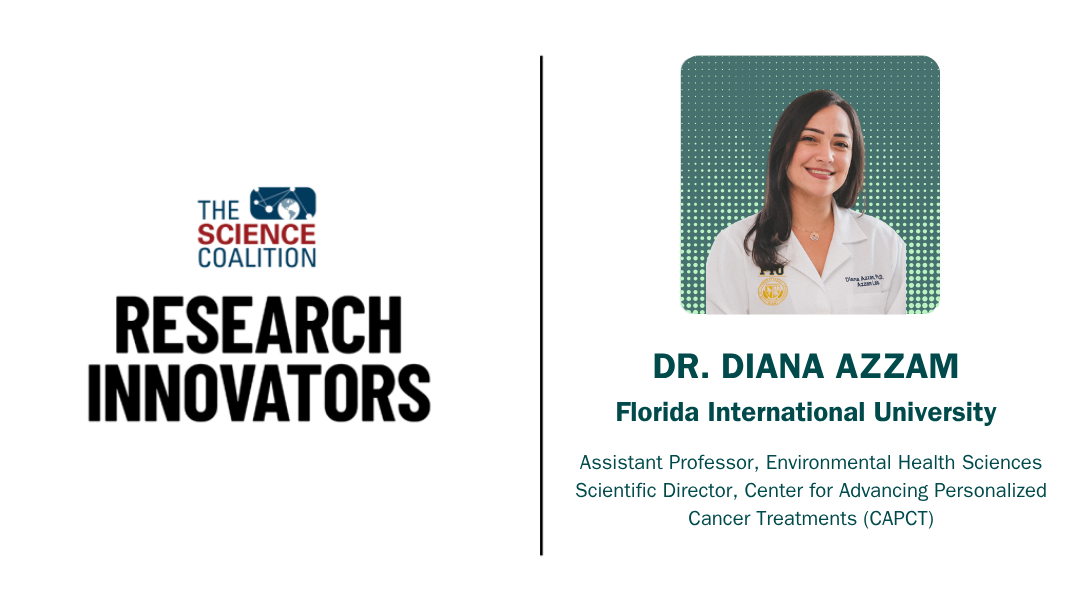Dr. Diana Azzam | From Curiosity to Clinical Breakthroughs
Dr. Diana Azzam’s journey in science is driven by a desire to understand why some cancer patients fail to respond to certain treatments. Her path — earning a PhD at the University of Miami studying therapy-resistant cancer cells, followed by postdoctoral research on drug screening and discovery, and then launching her independent lab at Florida International University (FIU) in 2016 — reflects a keen proclivity for translating cutting-edge research into life-changing treatments for patients. At every step of her scientific journey, federal funding has played a pivotal role.
Pioneering Functional Precision Medicine in Pediatric Cancer
Dr. Azzam stands at the forefront of innovation in cancer treatment. While traditional precision medicine uses DNA profiling to match tumors to targeted drugs, Dr. Azzam has taken this concept further using functional precision medicine. Rather than relying solely on genetic data, her method tests hundreds of FDA-approved drugs directly on living tumor cells extracted from individual patients. Leveraging advanced acoustic dispensing technology, this high-throughput drug sensitivity screening dramatically accelerates treatment decision-making from months – or even years – of trial and error down to just one week.
Dr. Azzam’s model is more than a technical marvel. It brings hope to children and adults with hard-to-treat cancers that resist standard therapies. In a landmark clinical trial conducted with Nicklaus Children’s Hospital, Dr. Azzam’s team exposed tumor samples from pediatric patients to over 120 drugs. The results provided oncologists with personalized treatment recommendations tailored precisely to each patient’s tumor biology, opening new doors when every other option had been exhausted.
Application in Action: Logan’s Story
Logan Jenner, diagnosed at age three with acute myeloid leukemia, endured multiple rounds of chemotherapy and a bone marrow transplant before his cancer came back. Out of options, Logan joined Dr. Azzam’s trial. Her team’s approach tested a wide range of medicines on his tumor sample, ultimately recommending a less toxic, two-drug combination that quickly triggered remission. Within 33 days, Logan’s cancer was gone, a remarkable improvement from the 150 days of his prior treatments. Today, Logan is healthy and thriving, a living testament to the power and promise of functional precision medicine.
This is not a singular success. Dr. Azzam’s study shows that 83% of children who received functional precision medicine guidance experienced meaningful clinical improvement. These results have triggered expanded National Institutes of Health (NIH)-funded trials to further validate and scale the method.
Fueling Discovery Through Public Funding
Dr. Diana Azzam’s breakthroughs didn’t emerge from a lab in isolation; they were made possible by a powerful network of federal, state, and philanthropic support. Early seed funding from the Florida “Live Like Bella” Pediatric Cancer Foundation launched a promising pilot, but sustained investment from the NIH enabled her team to scale their work. Support from Florida’s state government and philanthropic foundations helped build the technological and institutional infrastructure needed to move functional precision medicine from research to patient care.
“Federal support is the backbone of innovation in academic medicine,” says Dr. Azzam. “It fuels the collaborations, technologies, and clinical studies needed to bring bold ideas like functional precision medicine out of the lab and into hospitals – so the therapies we imagine can actually reach the people who desperately need them.”
The initial federal investment in Dr. Azzam’s therapy also laid the groundwork for the creation of a new private-sector startup. In 2018, Dr. Azzam co-founded First Ascent Biomedical, which aimed to bring functional precision medicine to broader patient populations. The company’s flagship platform, xDRIVE, integrates DNA/RNA sequencing and AI-driven analytics to deliver personalized treatment plans. First Ascent exemplifies how public funding can accelerate innovation beyond the academic setting, expanding access to personalized cancer care for communities across Florida and beyond.
Dr. Diana Azzam’s story embodies the transformative potential of sustained public investment in science. Backed by federal funding in her research efforts, and fueled by her relentless curiosity and dedication, she has pushed the boundaries of cancer treatment innovation. Today, her work offers patients and families a critical tool in the toughest cancer battles.


